OCZ Vertex 3 MAX IOPS & Patriot Wildfire SSDs Reviewed
by Anand Lal Shimpi on June 23, 2011 4:35 AM ESTLet's start with the elephant in the room. There's a percentage of OCZ Vertex 3/Agility 3 customers that have a recurring stuttering/instability issue. The problem primarily manifests itself as regular BSODs under Windows 7 although OCZ tells me that the issue is cross platform and has been seen on a MacBook Pro running OS X as well.
How many customers are affected? OCZ claims it's less than two thirds of a percent of all Vertex 3/Agility 3 drives sold. OCZ came up with this figure by looking at the total number of tech support enquiries as well as forum posts about the problem and dividing that number by the total number of drives sold through to customers. I tend to believe OCZ's data here given that I've tested eight SF-2281 drives and haven't been able to duplicate the issue on a single drive/configuration thus far.
Most of the drives were from OCZ and I've tested them all on four separate platforms - three Windows 7 and one OS X. The latter is my personal system where I have since deployed a 240GB Vertex 3 in place of Intel's SSD 510 for long term evaluation. If you're curious, the 3 months I had the 510 in the MacBook Pro were mostly problem-free. It's always tough narrowing down the cause of system-wide crashes so it's hard to say whether or not the 510 was responsible for any of the hard-resets I had to do on the MacBook Pro while it was deployed. For the most part the 510 worked well in my system although I do know that there have been reports of issues from other MBP owners.
But I digress, there's a BSOD issue with SF-2281 drives and I haven't been able to duplicate it. OCZ has apparently had a very difficult time tracking down the issue as well. OCZ does a lot of its diagnostic work using a SATA bus analyzer, a device that lets you inspect what's actually going over the SATA bus itself rather than relying on cryptic messages that your OS gives you about errors. Apparently sticking a SATA bus analyzer in the chain between the host controller and SSD alone was enough to make the BSOD problem go away, which made diagnosing the source of the BSOD issue a pain.
OCZ eventually noticed odd behavior involving a particular SATA command. Slowing down timings associated with that command seems to have resolved the problem although it's tough to be completely sure as the issue is apparently very hard to track down.
OCZ's testing also revealed that the problem seems to follow the platform, not the drive itself. If you have a problem, it doesn't matter how many Vertex 3s you go through - you'll likely always have the problem. Note that this doesn't mean your motherboard/SATA controller is at fault, it just means that the interaction between your particular platform and the SF-2281 controller/firmware setup causes this issue. It's likely that either the platform or SSD is operating slightly out of spec or both are operating at opposite ends of the spec, but still technically within it. There's obviously chip to chip variance on both sides and with the right combination you could end up with some unexpected behaviors.
OCZ and SandForce put out a stopgap fix for the problem. For OCZ drives this is firmware revision 2.09 (other vendors haven't released the fix yet as far as I can tell). The firmware update simply slows down the timing of the SATA command OCZ and SF believe to be the cause of these BSOD issues.
In practice the update seems to work. Browsing through OCZ's technical support forums I don't see any indications of users who had the BSOD issue seeing it continue post-update. It is worth mentioning however that the problem isn't definitely solved since the true cause is still unknown, it just seems to be addressed given what we know today.
Obviously slowing down the rate of a particular command can impact performance. In practice the impact seems to be minimal, although a small portion of users are reporting huge drops in performance post-update. OCZ mentions that you shouldn't update your drive unless you're impacted by this problem, advice I definitely agree with.
What does this mean? Well, most users are still unaffected by the problem if OCZ's statistics are to be believed. I also don't have reason to believe this is exclusive to OCZ's SF-2281 designs so all SandForce drives could be affected once they start shipping (note that this issue is separate from the Corsair SF-2281 recall that happened earlier this month). If you want the best balance of performance and predictable operation, Intel's SSD 510 is still the right choice from my perspective. If you want the absolute fastest and are willing to deal with the small chance that you could also fall victim to this issue, the SF-2281 drives continue to be very attractive. I've deployed a Vertex 3 in my personal system for long term testing to see what living with one of these drives is like and so far the experience has been good.
With that out of the way, let's get to the next wave of SF-2281 based SSDs: the OCZ Vertex 3 MAX IOPS and the Patriot Wildfire.
The Vertex 3 MAX IOPS Drive
In our first review of the final, shipping Vertex 3, OCZ committed to full disclosure in detailing the NAND configuration of its SSDs to avoid any confusion in the marketplace. Existing Vertex 3 drives use Intel 25nm MLC NAND, as seen below:
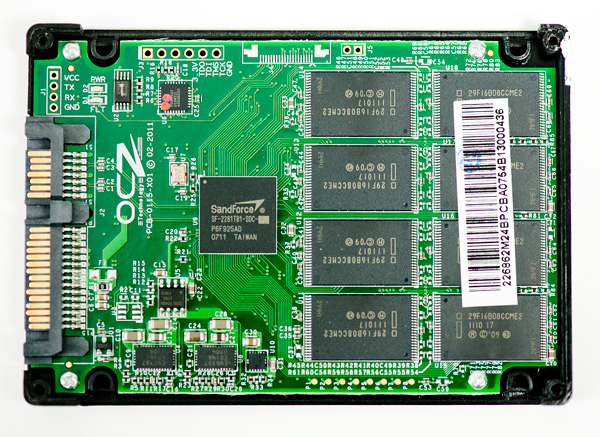
A 240GB Vertex 3 using 25nm Intel NAND
Not wanting to be completely married to Intel NAND production, OCZ wanted to introduce a version of the Vertex 3 that used 32nm Toshiba Toggle NAND - similar to what was used in the beta Vertex 3 Pro we previewed a few months ago. Rather than call the new drive a Vertex 3 with a slightly different model number, OCZ opted for a more pronounced suffix: MAX IOPS.
Like the regular Vertex 3, the Vertex 3 MAX IOPS drive is available in 120GB and 240GB configurations. These drives have 128GB and 256GB of NAND, respectively, with just under 13% of the NAND set aside for use as a combination of redundant and spare area.
The largest NAND die you could ship at 32/34nm was 4GB - the move to 25nm brought us 8GB die. What this means is that for a given capacity, the MAX IOPS edition will have twice as many MLC NAND die under the hood. The table below explains it all:
| OCZ SF-2281 NAND Configuration | |||||||
| Number of NAND Channels | Number of NAND Packages | Number of NAND die per Package | Total Number of NAND die | Number of NAND per Channel | |||
| OCZ Vertex 3 120GB | 8 | 16 | 1 | 16 | 2 | ||
| OCZ Vertex 3 240GB | 8 | 16 | 2 | 32 | 4 | ||
| OCZ Vertex 3 MI 120GB | 8 | 8 | 4 | 32 | 4 | ||
| OCZ Vertex 3 MI 240GB | 8 | 16 | 4 | 64 | 8 | ||
The standard 240GB Vertex 3 has 32 die spread across 16 chips. The MAX IOPS version doubles that to 64 die in 16 chips. The 120GB Vertex 3 only has 16 die across 16 chips while the MAX IOPS version has 32 die, but only using 8 chips. The SF-2281 is an 8-channel controller so with 32 die you get a 4-way interleave and 8-way with the 64 die version. There are obviously diminishing returns to how well you can interleave requests to hide command latencies - 4 die per channel seems to be the ideal target for the SF-2281.


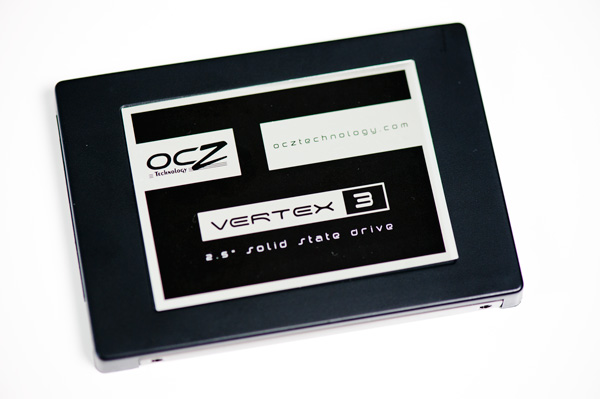
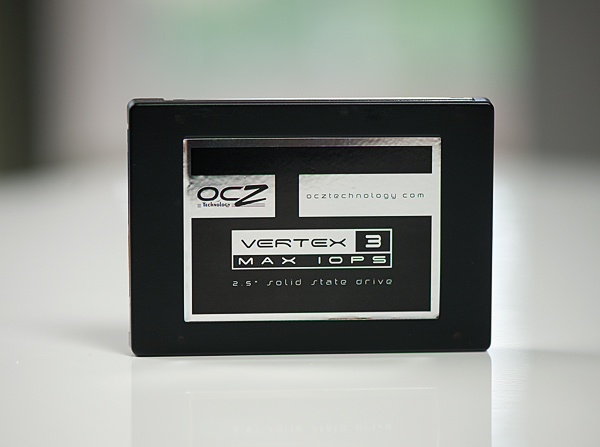
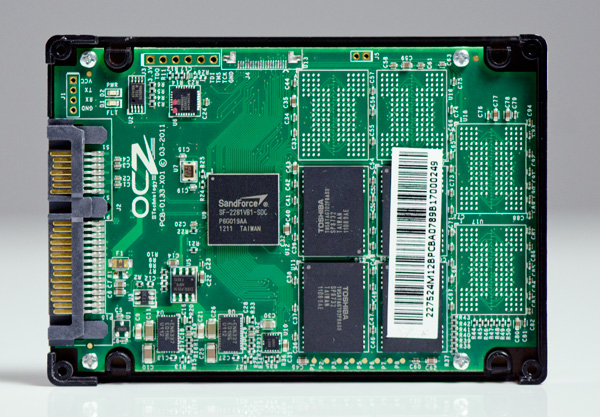
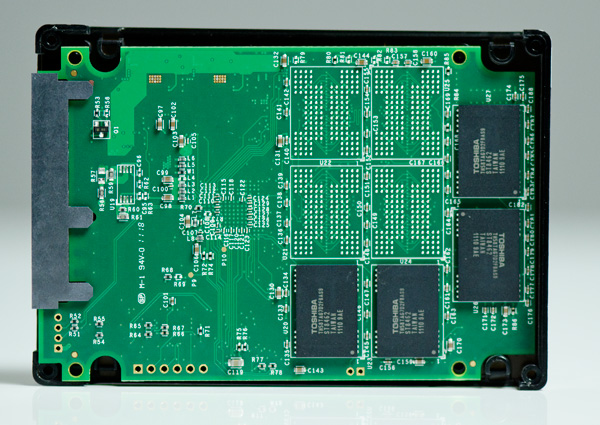
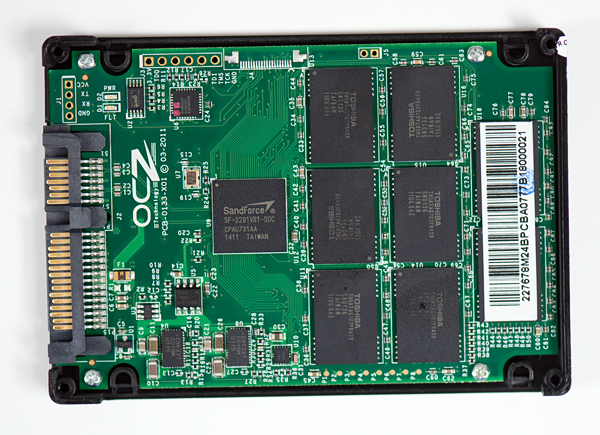
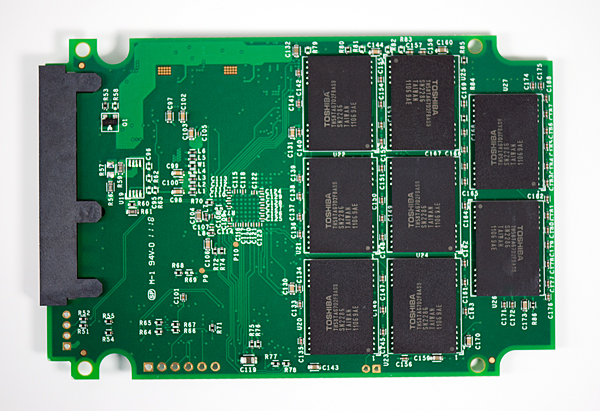








112 Comments
View All Comments
TrackSmart - Thursday, June 23, 2011 - link
My problem is not the failure rate of OCZ (or Corsair or Patriot) SSDs. Ordinary hard disks that we've been using forever have a 1-3% failure rate (or worse for some models). The problem is customer support for drives that aren't merely failing, but are *failing to be compatible* with particular hardware configurations.How a company deals with such problems is what determines if they deserve customer loyalty. And let me tell you that sending customers another of the same drive, that they know won't work with their system, is not a way to win customer loyalty. Just issue a refund and let the customer buy a different model. With that kind of treatment, the customer might buy another OCZ drive, but from one of the other product lines - instead of leaving angry.
The customer support issue is the one I want OCZ to address. And if Anandtech has personal communications with them, that is something worth passing on.
Anand Lal Shimpi - Thursday, June 23, 2011 - link
The issue is that, apparently, the majority of customers don't have a problem. There isn't a day that goes by where I'm not testing an SF-2281 drive in some fashion. Now it's possible that my usage model and test scenarios aren't enough to cause the problem, but I suspect that it's more complicated than that.My recommendation continues to be the Intel SSD 510 if you want the best balance of performance/predictable reliability. However if I simply recommend Intel's drive without mentioning a cheaper/faster drive I think I'll get accused of a different sort of bias :-P
Take care,
Anand
techinsidr - Thursday, June 23, 2011 - link
Good point Anand... I'm personally not a fan of OCZ products, but I give you props all the hard work you do on this site. Even if I don't agree with your recommendations 100% of the time, you still have the best hardware review site out there.I hope OCZ and Sandforce gets this problem figured out sooner than later. Performance is definitely important, but at the end of the day I think reliability is even more critical.
TrackSmart - Thursday, June 23, 2011 - link
I agree that it's a small percent, but is it okay to tell 10,000 customers "sorry, use it in a different computer" when they've spent $240 on a storage device? Just because it represents *only* 0.5% of their customers?Thanks for taking the time for a personal reply. And thanks for the superb articles and reporting. We'll just have to agree to disagree on what it means for a company to stand by a product.
Anand Lal Shimpi - Thursday, June 23, 2011 - link
No I agree that's not ok, but to the best of my knowledge OCZ has always facilitated a refund if you ask for one with situations like this. OCZ has apparently even offered to send engineers to your house and loan you a notebook to help diagnose the issue back when they had trouble tracking it down.My preference would be a stop shipment order until the problem is corrected. But in terms of customer service, I believe OCZ typically does take care of its customers.
Take care,
Anand
TrackSmart - Thursday, June 23, 2011 - link
Thanks Anand. I've had good experience with other OCZ products and associated support in the past. And it's possible that the 25nm debacle has caused them to shift their policies. At the time, when I purchased a Vertex 2, I was told replacement with a like item was the only option. Newegg came to my rescue and took the drive back, despite their clearly stated policy that SSD returns have to go to the manufacturer. Good on Newegg for understanding my situation. And hopefully good on OCZ if their policies have improved.A google search turns up people from the past who were turned down for Vertex 2/Agility 2 refunds (responses: firmware is on the way or use it in a compatible system - only exchanges for like models). But shows that Vertex 3 owners have been getting refunds.
So maybe I'm behind the times. And if so, my apologies to OCZ. These changes of policy must be within very recent past. A bit of bad press seems to go a long way to changing corporate policy.
jonup - Thursday, June 23, 2011 - link
Why is this review questionable? His recommendation is based on his personal experience with the drives. He has not experienced any BSODs but he disclosed that there are certain drives sold in retail that have the issue. He recommended OCZs drive as much as he recommended the Patriot's.I wouldn't be supprise if majority of the BSOD result from user tweaks and maybe if it is even a Windows problem.
semo - Thursday, June 23, 2011 - link
I wouldn't be as harsh and say that Anand has had underhand dealings with OCZ but there are bridges there. He gets new OCZ SSDs well before release dates so that he can prepare for in-depth articles. These articles bring a boat load of traffic to his domain.So indirectly, Anand does benefit from being on good terms with OCZ because if he didn't, he wouldn't have those golden samples and those spikes in traffic at launch.
Then again, timing is not the only thing that keeps us techies coming back. The quality of the articles plays a big part as well. I am however starting to question the Integrity of his work given the outcry in the community which is not proportionally reflected in Anand's official articles (this article touches on a few of the issues but the huge outcry from the last article must have played a big part). Also, I'm not just a techie, I'm also a consumer and I totally disagree with OCZ's handling of the 25nm fiasco and their customer relations in general.
Needless to say, I still enjoy Anand's articles but I will never touch an OCZ product again. Other companies provide just as much value and performance as them.
techinsidr - Thursday, June 23, 2011 - link
I couldn't agree more semo... I did a blog article covering this whole fiasco at my website techinsidr.com . The way OCZ has handled this fiasco leaves a lot to be desired..Anand Lal Shimpi - Thursday, June 23, 2011 - link
Access to hardware is never a reason to treat a manufacturer favorably. That may win you some short term gains but long term you lose credibility, which will ultimately and drives away the sort of quality readers you need to have a site truly survive.Also note that while exclusives do bring in more traffic, you actually build more traffic by being consistent and delivering quality over time. The former doesn't guarantee lasting traffic.
I don't believe OCZ is getting favorable treatment here, just the treatment that is representative of my experience with the drives. Now the response from the readership is clear that despite my experience, there's definite unease with actually jumping on the OCZ bandwagon until these sorts of complaints go away entirely. I can completely understand that sentiment and I will make sure it's reflected as we continue to cover this space.
Take care,
Anand